| Number 7 August 2003 |
|
|
|

|
The Economic Value of Linux |
||
| Who benefits from the rise of Linux? When I think of the Free Software Foundation-inspired work on the GNU libraries or of Linus Torvalds himself devoting his time to creating this new system, I doubt the goal was to increase the wealth of shareholders in large corporations. Yet this will be the biggest economic impact of the widespread adoption of Linux. It looks inevitable: going forward, it’s Linux vs. Windows. Solaris, HP-UX, and AIX are all falling before the might of the penguin. Given this, it’s worth thinking about where Linux’s economic value goes. Who benefits and who doesn’t? The big economic winners from the move to Linux are Global 1000 companies, the deep pockets of IT. Those that want to stick with Unix-based systems will find their costs dropping significantly. Their savings will derive mostly from the lower purchase price of the Intel-based hardware that Linux allows, not from the "free" Linux operating system, but the savings are nonetheless very real. (Besides, vendors like Red Hat are requiring customers to buy a license for every copy of their enterprise Linux products. If you haven’t seen it, the current Red Hat license is worth a look, especially Section 4, Reporting and Audit.) Intel is also clearly on the list of economic winners. As Linux displaces single-vendor versions of Unix, the processors those Unix versions depend on will disappear, too. Apart from IBM, it’s hard to imagine any vendor being successful with Linux on non-Intel platforms. Intel’s shareholders should be elated to watch the company’s processors asymptotically approach monopoly. Another big winner is Dell. They’ve proven to be the most successful focused provider of Intel-based systems, which until recently meant only Windows systems. Five years from now, my bet is that Dell will have derived the most economic benefit from selling server hardware for Linux. HP and IBM are also seeing their Intel-based server business grow because of Linux, but this growth comes at the expense of their proprietary (and higher-margin) Unix systems. Dell’s focus on Intel-based systems leaves them in just the right place to benefit from the rise of Linux. Capitalism is not a zero-sum game, but individual markets often are. While some reap economic benefits from Linux, others lose. Sun is the most obvious member of the loser camp, and Microsoft is also finding that Linux has begun to chip away at the price of Windows. Yet what about the people who created and maintain Linux and related open source technologies? Are they winners? The answer depends on your perspective. They qualify as winners because they get to work on an exciting technology that they might otherwise never have had the chance to be part of. They’re also winners in the sense that lots of people will use their work, an important motivation for software developers. But in pure economic terms, it’s hard to see most open source developers as winners. Think about it: the people who wrote their main competitor, Windows, all became rich thanks to Microsoft’s broad stock options. These developers received a significant share of the economic value that Windows created. The same can’t be said of Linux developers. Instead, the economic benefits of their work are flowing to the bottom lines of big companies. Open source developers often tell me that they’re not motivated by money. I can respect this–we all have the right to make our own choices–but whatever their motivations, the economic value they create accrues to somebody. There is some irony here. Open source developers, often driven by the desire to make the world a better place, have wound up enhancing the wealth of established corporations. One could argue that this does in fact make the world a better place. Somehow, though, I doubt many open source developers would agree.
|
|
||
 |
ITG Series Book Wins Jolt AwardEric Newcomer’s Understanding Web Services won Software Development magazine’s Jolt Productivity award earlier this year. Eric’s book is the second in Addison-Wesley’s Independent Technology Guides (ITG) series, for which I am series editor. Each book in the ITG series provides a solid introduction to an important new technology; it’s the first book a developer should read and the only book a technical manager needs to read on the subject. Look for more titles in this series soon.
|
||
|
|||
 |
David Chappell is Principal of Chappell & Associates (www.davidchappell.com) in San Francisco, California. Through his speaking, writing, and consulting, David helps information technology professionals around the world understand, use, market, and make better decisions about enterprise software technologies. David has given keynotes at conferences and in-house events in the U.S., Europe, Latin America, and the Middle East, and his seminars have been attended by tens of thousands of developers and decision makers in thirty-five countries. David’s books have been translated into ten languages and used in courses at MIT, ETH Zurich, and other universities. His consulting clients have included HP, Microsoft, Stanford University, and other technology vendors and users.
|
©Copyright2007
David Chappell and Associates
|
|
||||